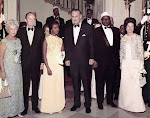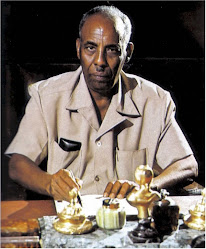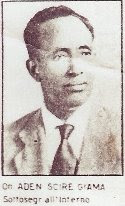Omar Hammami before conversion
 Growing up in Daphne, Alabama, Omar Hammami (born 1984) was your average American, teenage boy. He liked girls, sports, playing video games — until the Qur’an changed his life forever. No doubt his father, Shafik Hammami, had been a passive influence as a practicing Muslim, serving as president of the Islamic Society of Mobile and heading the Al-Imam Muslim Academy. Interestingly, the town of Daphne is a small, tight-knit community of Southern Baptists, a religious affiliation that Omar wrestled with in his formative years. With a Baptist mother and Muslim father, young Omar struggled to define his religious identity. In high school, Omar was an affable extrovert, a leader amongst his peers and popular with the girls ripe in their crushes. As president elect of his sophomore class, he had already landed the prize blonde of his school. Former schoolmates of Omar describe him as confident and charismatic, noticeably undeterred by the thickening atmosphere of gossip that began enshrouding him after his orthodox makeover began. By all accounts, Omar was a gifted student with a healthy social life, though gradually forfeited the profits of youth on his path of reinvention.
Growing up in Daphne, Alabama, Omar Hammami (born 1984) was your average American, teenage boy. He liked girls, sports, playing video games — until the Qur’an changed his life forever. No doubt his father, Shafik Hammami, had been a passive influence as a practicing Muslim, serving as president of the Islamic Society of Mobile and heading the Al-Imam Muslim Academy. Interestingly, the town of Daphne is a small, tight-knit community of Southern Baptists, a religious affiliation that Omar wrestled with in his formative years. With a Baptist mother and Muslim father, young Omar struggled to define his religious identity. In high school, Omar was an affable extrovert, a leader amongst his peers and popular with the girls ripe in their crushes. As president elect of his sophomore class, he had already landed the prize blonde of his school. Former schoolmates of Omar describe him as confident and charismatic, noticeably undeterred by the thickening atmosphere of gossip that began enshrouding him after his orthodox makeover began. By all accounts, Omar was a gifted student with a healthy social life, though gradually forfeited the profits of youth on his path of reinvention.On one such occasion Omar prayed in the school courtyard before a curious group of onlookers stealing wide-eyed glances. Hypnotized in Salah (formal prayer), his desperate petitions chanted toward Mecca, Omar’s transformation into a Salafi was an unusual sight within the quaint, Bible Belt community. Though once struggling to find his own voice between Bible Camp and the strictures of Islam imposed on the household by his father, he eventually shifted toward Islam and faced certain ostracism by his Christian peers. By 2002, Omar was well-versed in Arabic and teachers recount that he began affecting a Middle Eastern accent. Despite pursuing college, he dropped out after the World Trade Center attacks to assimilate with the expansive culture of Muslims in Canada. Though he thought the 9/11 attacks were acts of senseless violence, he was also beginning to express sympathy toward hard-line Islamic regimes. He spent countless hours in his favorite Islamic bookstore in Toronto, and when he wasn’t pouring over religious texts he was in Internet chat forums aggregating anti-American sentiments.
Omar in full militia regalia
 While in Toronto, barely 20 years old, Omar took a Somalian-Canadian wife and she had his child. The family of three moved to Egypt, presumably as Omar was establishing international connections via the Web and preparing to realize his fully-integrated Muslim identity to come — Abu Mansoor Al-Amriki. Alas, the all-American boy from sweet home Alabama was dead and an American-Jihadist icon emerged in his place. Shortly thereafter, Al-Amriki (Omar) abandoned his wife and newborn child, and fled to Somalia where he was to join the radical paramilitary group Al-Shabaab. Climbing quickly through the ranks, Al-Amriki was able to make good use of the traits that characterized him in high school. His Western education, pop culture savvy, and cool demeanor made him a successful recruiter, particularly of American Muslims with an axe to grind. As of summer 2010, he has recruited two dozen American Muslims, two of which who carried out successful suicide bombings against a UN compound and the Ethiopian Consulate. In effect, Al-Amriki was making sheikh chic.
While in Toronto, barely 20 years old, Omar took a Somalian-Canadian wife and she had his child. The family of three moved to Egypt, presumably as Omar was establishing international connections via the Web and preparing to realize his fully-integrated Muslim identity to come — Abu Mansoor Al-Amriki. Alas, the all-American boy from sweet home Alabama was dead and an American-Jihadist icon emerged in his place. Shortly thereafter, Al-Amriki (Omar) abandoned his wife and newborn child, and fled to Somalia where he was to join the radical paramilitary group Al-Shabaab. Climbing quickly through the ranks, Al-Amriki was able to make good use of the traits that characterized him in high school. His Western education, pop culture savvy, and cool demeanor made him a successful recruiter, particularly of American Muslims with an axe to grind. As of summer 2010, he has recruited two dozen American Muslims, two of which who carried out successful suicide bombings against a UN compound and the Ethiopian Consulate. In effect, Al-Amriki was making sheikh chic.In the past few years Al-Shabaab has made several media touchdowns, Abu Mansoor Al-Amriki their spokesman (“Al-Amriki” means The American). He has openly declared holy war, praised the death of martyrs, and expressed allegiance to Osama Bin Laden’s worldview and methodology. His band of rebels are known for beheading political enemies, chopping off the hands of thieves, and stoning women accused of adultery all in attempt to intimidate and eventually overthrow the Somali government. Consequently, a boy who loves soccer, Nintendo, and Kurt Cobain has become one of the most-wanted guerillas alive. Omar Hammami is a perfect storm of sorts — the religious dichotomy of his upbringing drew a harsh line that would later become an archetype of Christian/Muslim polarization and foreshadow the war he would wage against Somalian Christians. Moreover, Islam became a convenient vehicle for him to affirm his namesake, go against the religious tide of the Southern community, and empower himself as a determined lone wolf. Lastly, the 9/11 attacks were pivotal in transforming Omar into Al-Amriki, as the attacks prompted him to network deep in the online Islamic community where he was to be comprehensively seduced by socio-political grievances seemingly supported by the Qur’an. As a result, a divine purpose crystallized for him that not only justified treason, but would greatly serve the resistance cause — being an American would facilitate additional American recruitment. These factors were only exascerbated by Omar’s fierce independence and huge ego, as he was often told in school he would “amount to something big” and was “a born leader.” Alas, a terrorist was born who fancies himself as a freedom fighter. Yet only eight years ago he was working at Walmart and refused to touch alcohol, pork, and Christmas cards — we wouldn’t want a guy who stones women to feel unclean, would we? The good news is that he’s a bit of a cliche soon to be caught, trained on first-person shooter games and reading Catcher In The Rye. And even while calling some part of the African desert home now, he still posts on Facebook using dummy accounts. That must be the part of him that’s still American. Brad Barrett (aka Jeff Blazer).



.jpg)











No comments:
Post a Comment